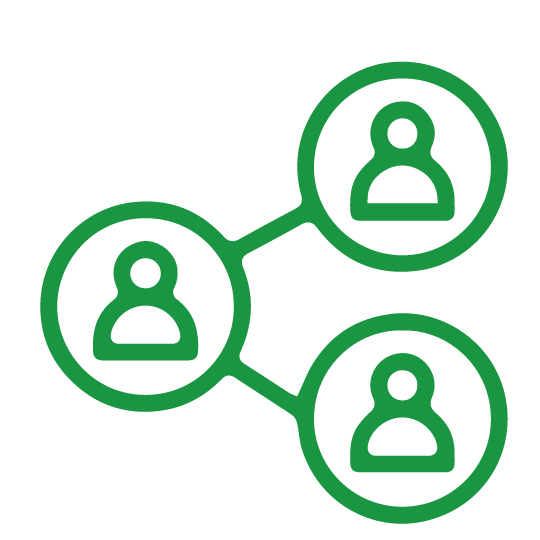Justa de Graaff played eight years in the top of the Eredivisie handball and then continued her career by guiding transformations at large corporates such as ProRail, Schiphol and Dura Vermeer. "Digital transformations are still far too often framed from ICT. While it starts and ends with people."
She was planning to take up another self-employment assignment this year. The website had already been redesigned when she chose a career with consultancy firm Improven after all. There, she became director of business and IT. "That does say something about how I stand in a digital transformation. As important as ICT is, digital transformation is first and foremost a business transformation and requires people-oriented leaders. I also think this is a major pitfall for digital transformations. You can want to implement such a great ICT system, if employees are not behind it, the implementation will definitely not be a success!" She learnt that lesson in roughly 20 years of managing change. "After my MBA at VU University Amsterdam, I was ready to take the world by storm. I thought I was tackling the Unilevers and Philipsen of this world and, while employed by Deloitte, was involved in many finance transformations. Setting up shared service centres, for example. What disappointed me at the time was that these were mainly spreadsheet projects. They tackled large projects very methodologically, while I mainly wanted to know what was going on in the heads of the employees."
Bringing people
Then, in the five years at ProRail, she learned not to ram through the field, as she puts it, but to bring people along for the ride. "Connecting and slowing down to bring everyone along. That experience didn't quite match the speed I normally like to go at, so it was very instructive for me. With twenty young dogs, called lean coaches, we tried to change the organisation. They were actually twenty speedboats trying to change the unwieldy tanker's course. This was mainly about the customer process. Who is the customer anyway? And: How do we get a learning organisation so that we solve network failures better? That often involves being willing and able to look over your own fence, working together across borders and wanting to improve continuously."
"As important as ICT is, digital transformation is first and foremost a business transformation and requires people-focused leaders."
Connecting
In 2018, she embarked on a major digital transformation programme for Royal Schiphol Group. In roles as Program Improvement Manager, Program Lead Business Transformation and Project Manager Digital Finance. "The digital finance programme focused on creating more insight based on data. In doing so, we mainly wanted to simplify, standardise and automate end-to-end processes in finance, procurement and ICT. In doing so, we also replaced outdated on premise systems with cloud solutions. These included ERP, systems for planning, budgeting and financial consolidation, a billing system and a CRM system. All these systems went to the cloud. That programme was so big that we also suffered from silos within it. It was important that we also spent a lot of time within the programme team shaping collaboration. From creating schedules together to weekly kick-offs... Everything to connect with each other for improved performance."
No replacement
The original plan was to complete the transformation in one year, but it turned into three. De Graaff: "Often, organisations don't really know what they are getting into, or what kind of system they are buying. 'Just tell us' is then the motto. This makes it difficult to find exactly what the need is. Added to this, organisations are simply busy with operational matters. It is remodelling the shop while it is open. A digital transformation is not replacing current systems, but implementing a new way of working. Think about standardising and harmonising processes. In the process, you find out, for example, that the data are not structured now to function in the new situation. Then you have to set up data governance. In this way, things keep coming up that still need to be arranged. It is also important that employees are included in the change and thus receive training in how the systems work. All this often takes more time than initially thought."
Spending more time on the preliminary process
De Graaff advises organisations to spend more time on the preliminary process. "What all should the system be able to do? How should our organisation change? Also invest extra time in the staff at the supplier you are going to work with. You want a real partnership where you don't have to pay for every little extra. You want a cooperation in which there is give and take, back and forth. In short, a request for proposal for an ICT system is good, but you simply cannot capture everything in it. In any case, you cannot capture the feeling in it that you have confidence in each other. That things will work out with the partner you have chosen." Another pitfall: "Don't try to capture old processes in a new system. I am not in favour of that. You can, however, implement the system to work towards a standard." At Schiphol, De Graaff worked towards improving the foundation. "Getting the data in order so that you can extract dashboard and reports from it. You need that foundation otherwise you can't take further steps towards, for example, robotising processes or towards artificial intelligence."
Data-driven working
Then the key question to De Graaff's specialism: how do organisations get their employees on board with data-driven work? "The question is actually: how do I get a learning organisation? You get that by encouraging employees to be allowed to experiment. Where mistakes are not immediately punished. In doing so, management has to set an example. Do you dare to let your employees make their decisions based on data? Of course, this is also exciting for employees, so you have to help and encourage them. You can also call it a pilot, so it takes some of the pressure off. Go and experience this new way of working for yourself. You can also give your employees space to give input on how they can best use the system and make it their own. That creates a lot of energy to dive in further. In short, create a safe environment for employees to work with the systems and data."
"Often, organisations are not quite sure what they are getting into and also not quite sure what kind of system they are buying."
What does the change mean?
Finally, De Graaff warns against what she calls bullshit bingo. "Digital transformation sounds good and is sexy. Terms like blockchain and artificial intelligence fly around your ears. But those are hypes. As an organisation, you have to look at solutions to an existing problem. The technology has to fit that. You cannot ask from the thought of a hype whether the organisation should use it. It works the other way round. Look at what the problem is. See what the change is. And then just start with the biggest small step possible. I also think that digital transformation is too much framed from ICT. You then see this approach reflected in business cases that ultimately do not match reality. Because there is too little budget or the estimated time is exceeded. You need to be able to outline the change process together with the business prior to implementation. ICT and business must tackle the digital transformation together. Preferably with a translator in between so that both disciplines understand each other. As director, make as concrete as possible what needs to happen. Break down parts so it becomes manageable. If work has to be done differently because of the new systems, lead the way as director. If all goes well, as a leader you should also get out of your comfort zone. Really live through what the change means. Both for the organisation and for the employees."
This article was published on 8 November 2022: https://executivefinance.nl/2022/11/digitale-transformatie-begint-en-eindigt-bij-de-mens/






















